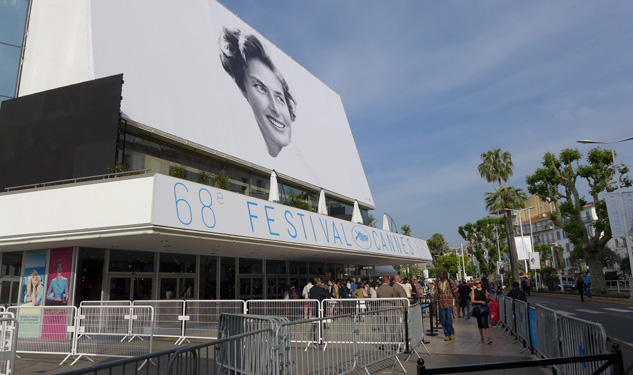
- Industry
Cannes 2015
Opening night with a female director, french film-makers dominate Critic’s Week and a very diverse jury. The Cannes Film Festival gets underway today on the Riviera. Elisabeth Sereda previews the proceedings
You gotta hand it to the powers that be in Cannes – they have very good ears. And they heard last year’s message loud and clear. When even 2014 jury president Jane Campion strongly criticized the absence of female directors, the world chimed in and the festival got some of its worst reviews on gender discrimination. Their response: for the first time in 28 years the opening night film La Tete Haute (starring Catherine Deneuve) is helmed by a woman, Emmanuelle Bercot. The last woman-directed film to open Cannes was Diane Kurys’ A Man in Love in 1987. And although the line-up for Critics Week is 100% male – with four French works including the opening and closing night films, the prestigious Directors Fortnight section features three female directors: Chloe Zhao’s Songs My Brothers Taught Me about the complex relationship between siblings on the Pine Ridge Indian Reservation already had a successful world premiere at the Sundance Festival in January. Turkish director Deniz Gamze Erguven brings Mustang to Cannes, a story of female empowerment set within a family with three young daughters who try to deal with stifling traditions in a remote Turkish village.
Allende, mi abuelo Allende is the third entry. A documentary Chilean president Salvador Allende that shows the chasm between his public and private persona, was directed by none other than his granddaughter Marcia Tambutti.
Among the 19 features in the Directors’ Fortnight three are directed by Portuguese Miguel Gomes. His six-hour trilogy, Arabian Nights will be shown in three separate screenings.
Another highlight of this section is the recent Sundance hit comedy thriller Dope and A Perfect Day, the English-language debut of Fernando Leon de Aranoa, starring Benicio Del Toro, Tim Robbins and Olga Kurylenko. Films from Lithuania, Morocco, Sweden, Japan, South Africa and France round out the Directors’ Fortnight. It is once again the main competition that lacks females behind the camera. The official selection includes two U.S. films: Carol, a 1950s lesbian love story with Cate Blanchett, and Gus Van Sant’s suicide drama The Sea of Trees with Ken Watanabe and Matthew McConaughey. Canada’s entry is Denis Villeneuve’s Mexican drug-cartel drama Sicario, starring Emily Blunt, Benicio del Toro and Josh Brolin. Australia’s Justin Kurzel comes with his Shakespeare adaption of Macbeth with Michael Fassbender and Marion Cotillard in the lead roles. The majority of entries here certainly do not lack star power: Norway’s Joachim Trier shows the family drama Louder Than Bombs with Gabriel Byrne, Jesse Eisenberg and Isabelle Huppert.
The Lobster, a scifi-thriller stars Colin Farrell and Rachel Weisz, who also appears in Paolo Sorrentino’s Youth with Michael Caine, Jane Fonda and Harvey Keitel. And fellow Italian Matteo Garrone has The Tale of Tales, a CGI-fantasy with Salma Hayek, Vincent Cassel and John C. Reilly.
The fate of these films and which one will win the Palme d’Or will be decided by a star-powered jury under presidents Joel and Ethan Coen: Jake Gyllenhaal, France’s sweetheart Sophie Marceau, Pedro Almodovar-muse Rossy dePalma, Sienna Miller, Mali-born singer Rokia Traore, Mexican director Guillermo del Toro and last year’s jury prize winner Xavier Dolan.
As usual Hollywood films are mostly shown out of competition. Woody Allen’s Irrational Man with Emma Stone and Joaquin Phoenix falls into this category, as do Mad Max: Fury Road with Tom Hardy and Charlize Theron and Pixar’s newest, Inside Out.
Highly anticipated is the directorial debut of one more female director: none other than Natalie Portman will premiere her adaption of Amos Oz’s bestseller A Tale of Love and Darkness which she shot entirely in Israel last summer.
The Un Certain Regard section of the festival will once again feature films by new talents as well as already accomplished auteurs and includes works from India, Iceland, South Korea, Iran and Romania.
One midnight screening will have lines around the block for sure: Amy, the documentary portrait of the late singer Amy Winehouse.
Of course, Cannes would not be Cannes without the usual sideshow: the sponsors, the parties, the array of cheap starlets and wannabe producers, the throwing around of money of questionable origin. On the high end of this spectrum there is the annual amFar gala that usually raises the highest amount of cash of any charity event, and Chopard (who at least feign a connection to the film industry by honoring two newcomers with their Trophee Chopard). In the medium range are parties thrown by Grisogogno and some U.S. fashion designers. At the low end are sponsor driven afterparty-premiere events that make real stars run for cover after an obligatory appearance of no more than 15 minutes. And presentations of upcoming projects that need financial infusion and will or will not ever be made.
C’est la Cannes.
Elisabeth Sereda
Check out our walking tour of Cannes: CLICK HERE!

